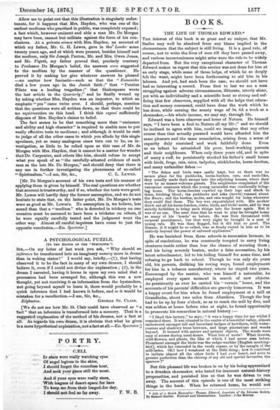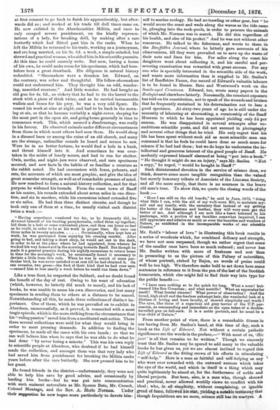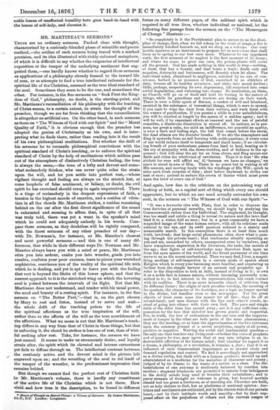BOOKS.
THE LIFE OF THOMAS EDWARD.* THE interest of this book is so great and so unique, that Mr.
Smiles may well be absolved from any blame implied in the circumstance that the subject is still living. It is a good rule, of course, not to write the lives of men till they have passed away, and various inconveniences might arise were the rule to be widely departed from. But the very exceptional character of Thomas Edward makes us regret that this service was not done for him at an early stage, while some of those helps, of which he so deeply felt the want, might have been forthcoming to aid him in his labours. And yet, had such been the case, we should not have had so interesting a record. From first to last we see a man struggling against adverse circumstances, illiterate, utterly alone, yet with an individuality and a scientific bent so strong and suf- ficing that few observers, supplied with all the helps that educa- tion and money command, could have done the work which he has done, while earning the scanty wage of 95. 6d. a week as a shoemaker,—his whole income, we may say, through life.
Edward was a born observer and lover of Nature. He himself says, "I have been a fool to Nature all my life ;" and we should be inclined to agree with him, could we imagine that any other course than that actually pursued would have afforded him the same pleasure and the same consolation, arising from a sense of capacity duly exercised and work faithfully done. Even as an infant he astonished his poor, hard-working parents and their neighbours. When only three years old, and in spite of many a cuff, he persistently stocked his father's small house with birds, frogs, rats, mice, tadpoles, sticklebacks, horse-leeches, and many unfamiliar fishes :—
"The fishes and birds wore easily kept, but as there was no secure place for the puddocks, horse-leeches, rats, and such-like, they usually made their escape into the adjoining houses where they were by no means welcome guests. The neighbours complained of the venomous creatures which the young naturalist was continually bring- ing home. The horse-leeches crawled up their legs and stuck to them, fetching blood ; the puddocks and asks (newts) roamed about the floors ; and the beetles moles, and rats sought for holes wherever they could find them. The boy was expostulated with. His mother threw out all his horse-leeches, crabs, birds, and birds'-nests, and he was strictly forbidden to bring such things into the house again. But it was of no use. The next time that he went to play he brought home as many of his ' beasts ' as before. He was then threatened with corporal punishment, but that very night he brought in a neat of young rats. He was then flogged, but it did him no good. The disease, if it might be so called, was so firmly rooted in him as to be entirely beyond the power of outward appliances."
He was banished from. three schools in succession because, in spite of resolutions, he was constantly tempted to carry living
creatures inside rather than lose the chance of securing them ; and his being severely beaten, under a false accusation, by his latest schoolmaster, led to his hiding himself for some time, and refusing to go back to school. Though be was only six years old, his parents, disliking his roving ways, found employment for him in a tobacco manufactory, where he stayed two years. Encouraged by the master, who was himself a naturalist, he employed every spare moment in search of new objects. As persistently as ever he carried his " vermin " home, and the accounts of his parents' difficulties are gravely humorous. It was a happy event for him when he found employment at a mill at Grandholm, about two miles from Aberdeen. Though the boy had to be up by four o'clock, so as to reach the mill by five, and was seldom at home before nine at night, he found opportunity to prosecute his researches in natural history :—
" I liked this factory," he says ; "it was a happy time for me whilst I remained there. It was situated in the centre of a beautiful valley, almost embowered amongst tall and luxuriant hedges of hawthorn, with water- courses and shadowy trees between, and large plantations and woods beyond. It teemed with nature and natural objects. The woods were easy of access during meal-hours. What lots of nests I What insects, wild-flowers, and plants' the like of which I had never seen before. Prominent amongst the birds was the sedge-warbler [English mocking- bird], which lay concealed in the reedy copses, or by the margin of the mill-lades. Oh! how I wondered at the little thing ; how it contrived to imitate almost all the other birds I had ever heard, and none to greater perfection than the chirrup of my old and special favourite, the sparrow !"
But this pleasant life was broken in on by his being apprenticed to a drunken shoemaker, who hated his innocent natural-history propensities, and punished him so that he was driven to run away. The account of this episode is one of the most striking things in the book. When be returned home, he would not * L's of a Scotch Eaturalist: Thomas Edward, Assodate oJ the Was** Soddy. By Samuel Sullies. Portrait and Illustrations. London: John Murray.
at first consent to go back to finish his apprenticeship, but after- wards did so ; and worked at his trade till dull times came on.
He now enlisted in the Aberdeenshire Militia, and once he only escaped severe punishment, on the kindly represen- tations of a lady, for breaking drill, by making after a rare butterfly which had flitted past him in the ranks. When he left the Militia he returned to his trade, working as a journeyman, and ere long married, on his 9s. 6d. a week, a simple-minded, but shrewd and practical woman, who aided him in his scientific pursuits. At this time he could scarcely write. But now, having a house of his own, he could make room for his specimens, which had here- tofore been a great drawback. His diligence in natural history redoubled. "Shoemakers were a drunken lot. Edward, on the contrary, was sober and thoughtful. His fellow-shoemakers could not understand him. They thought him an odd, wander- ing, unsettled creature." And little wonder. He had bought an old gun for 4s. 6d., so rickety that he had to tie the barrel to tbe stock with a piece of thick twine, and as he carried innumerable wallets and boxes for his prey, he was a very odd figure. He ceased his work at nine at night, and had to be back in the morn- ing at six, so that he became veritably a night-rover, sleeping for the most part in the open air, and going home generally in time to commence work. This, which seemed a disadvantage, was really in his favour. He observed animals under different circumstances from those in which most others had seen them. He would sleep in a disused barn or among the ruins of an old church, and many are the strange, unfamiliar sounds he heard and scenes he saw. Were he in no better fortune, he would find a hole in a bank, and thrust himself into it. And sometimes he was over- taken in the midst of lonely moors, and had to run for shelter.
Owls, moths, and night-jars were observed, and rare specimens secured, and new facts In the habits of so familiar a creature as the rabbit noted. He had encounters with foxes, polecats, and rats, the accounts of which are most graphic, and give the idea of great muscular strength, as well as of remarkable presence of mind. He now resolved to form a natural-history collection, and for that purpose he widened his bounds. From the coast town of Banff as his centre, his rounds extended about seven miles in one direc- tion, and six in another, while his excursions inland extended five or six miles. He had thus three distinct circuits, and though he took only one of them at a time, he usually visited each district twice a week :—
"Having sometimes wandered too far, as he frequently did, he divested himself of his hunting paraphernalia, rolled them up together, hid them in a hole or some convenient place, and then ran home as fast as he could, in order to be at his work in proper time. He once ran three miles in twenty minutes Occasionally, when kept late at work, he was prevented from enjoying his evening ramble. After going to bed, and taking a short sleep, he would set out in the dark, in order to be at the place where he had appointed, from whence he worked his way homeward in the morning towards Banff. But though he made it a general practice during his nightly excursions to return home in time for the morning's work, he occasionally found it necessary to deviate a little from this rule. When he was in search of some par- ticular bird, he was never satisfied or at rest till he had obtained it. On one occasion, two geese—the first of their kind that he had ever seen —caused him to lose nearly a week before he could run them down."
Like a true Scot, he respected the Sabbath, and no doubt found the benefit of the day of rest. Owing to his want of education (which, however, he latterly did much to mend), and his lack of books, he was unable to name his own discoveries, and lost many specimens in sending them to others at a distance to be named. Notwithstanding all this, he made three collections of distinct im- portance. One of these, which he was prevailed on to exhibit in Aberdeen, unsuccessfully, as it proved, is connected with a most tragic episode, which is the more striking from the circumstance that his " ruling passion" saved him from a meditated rash action. These three several collections were sold for what they would bring in order to meet pressing demands. In addition to finding the specimens, he made all the cases with his own hands ; so that we can well believe him when he says that he was able to do what he had done "by never losing a minute." This was his own reply to scientific people at Aberdeen, who doubted if he had himself made the 'collection, and amongst these was that very lady who had saved him from punishment for breaking the Militia ranks years before after the rare butterfly. She now pressed him to be her guest.
He found friends in the district—unfortunately, they were not able to help him save by good advice, and occasionally by lending him books—but be was put into communication with such eminent naturalists as Mr. Spence Bate, Mr. Crouch, Colonel Montagu, and the Rev. A. Merle Norman, Under their suggestion he now began more particularly to devote him-
self to marine zoology. He had no trawling or other gear, but "he would scour the coast and wade along the waves as the tide came in, plunging into the rock-pools, in order to procure the animals of which Mr. Norman was in search. He did this regardless of his health, and also of his pocket." And he was not without other
resources. He talked to the fishermen, and wrote to them in the Banffshfre Journal, where he latterly gave accounts of his observations, till they were prevailed on to save up the waste of their nets and lines for him, For miles along the coast his daughters went about collecting it, and his careful and per- severing examination was rewarded with great success. For any one who is specially interested in the scientific side of the work, and wants more information than is supplied in Mr. Smiles's list of Banffshire Fauna, due record of Edward's valuable labours is to be found in Messrs. Bate and Westwood's work on the Sessile-eyed Crustace,a. Edward, too, wrote many papers in the- Zoologist and elsewhere latterly. Necessarily, the constant exposure has told on his constitution, not to speak of the wounds and bruises that he frequently sustained in his determination not to lose, a good specimen. At sixty-two years of age he is still under the necessity of labouring at shoemaking, a curatorship of the Banff Museum to which he has been appointed yielding only £4 per annum. He was disappointed in several attempts after un- ambitious scientific posts, and did not succeed in photography and several other things that he tried. His only regret that his life has been spent without such aid as most scientific men can command is that he feels he could have done so much more-for science if he had had them; but we do hope he underrates the in- tellectual and generous interest of the good people of _Banff. He modestly expressed himself alarmed at being "put into a book.' "He thought it might do me an injury," says Mr. Smiles. "Not a copy," he urged, "would be bought in Banff 1"
Such disinterested devotion in the service of science does, we think, deserve some more tangible recognition than the -valued but merely honorary tribute of Associate of the Linnwan Society, and all the more surely, that there is no sourness in the brave old man's tone. To show this, we quote the closing words of the book :—
" Hera I am still on the old boards," he said in June, 1875, "doing what little I can, with the aid of my well-worn Kit, to maintain my- self and my family, with the certainty that instead of my getting the better of the lapstone and leather, they will /very soon get -the better of me. And although I am now like a beast tethered to his pasturage, with a portion of my faculties somewhat impaired, 'I can still appreciate and admire as much as ever the beauties and wonders of Nature, as exhibited -in the incomparable works of our adorable Creator."
Mr. Reid's "labour of love" in illustrating this book results in a series of woodcuts which, for combined delicacy and strength, we have not seen surpassed, though we rather regret that some of the smaller ones have been so much reduced ; and never has. Mr. Smiles written with more of freshness and zest than in presenting to us the picture of this Palissy of naturalists, of whose portrait, etched by Rajon, no words of praise could well be too high. We therefore make bold to set down here some sentences in reference to it from the pen of the last of the 'Scottish humourists, which else. might fail to find their way into type for the public benefit :— " I have seen nothing so to the quick for long. What a nose but- tressed like Ben Crnachan ; and what nostrils ! What an apparatus for smell ! What frontal sinuses What power of observation! And the broad, high skull and the fearless unkempt hair, the wonderful look of a lifetime of loving and keen faculty, of shrewd simplicity and worth I The eyes, like those of a sagacious old grey terrier of the IT.P. per- suasion as commanding and immediate as the open tubes of a double- barrelled gun on full-cock. It is a noble portrait, and he must be a true child of Nature."
From another point of view, there is a remarkable fitness in our having from Mr. Smlles's hand, at this time of day, such a book as the Life of Edward. Not without a certain pathetic significance are the words in the preface,—" With most of us, 'Bic facet' is all that remains to be written." Though we sincerely trust that Mr. Smiles may be spared to add many to the valuable books he has given us, yet we are almost inclined to regard this Life of Edward as the fitting crown of his efforts in stimulating "self-help." Here is a man as faithful and self-helping as any who were ever rewarded with the outward success which takes the eye of the world, and which in itself is a thing which may quite legitimately be aimed at, for the furtherance of noble and liberal projects. But here, also, is a man who, though shrewd and practical, never allowed worldly views to conflict with his ideal ; who, in all -simplicity, without complaining, or ignoble greed of fame, followed his star, yielding a notable testimony that though Inquisitions are no more, science still has its martyrs. A
noble lesson of unaffected humility here goes hand-in-hand with the lesson of self-help, and elevates it.




































 Previous page
Previous page